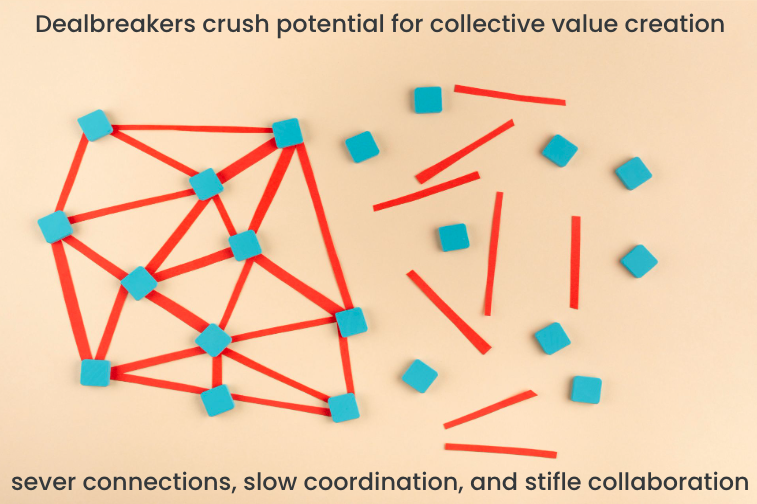Addressing Network Dealbreakers – PoP Up Session Recap
PoP Up sessions are a space for network practitioners to dialogue about Problems of Practice.
In our PoP Up session on July 16th, we gathered to explore one of the most critical—and complex—topics in network practice: dealbreakers. These are moments when interactions can undermine the health of a network and fracture the trust and participation it depends on.
Together, we examined four common dealbreakers and offered network practices (practice moves) with potential to both prevent and repair experiences that inhibit connection and collaboration.
1. Directives Trump Agency
When decision-making becomes centralized, networks lose their participatory power.
Practice moves:
Replace top-down decisions with proposals developed through holistic listening.
Clarify leadership roles as facilitators, not gatekeepers.
Build consistent feedback loops and cultivate a culture of contribution.
2. Self-Interest Over Collective Interest
When individual agendas outweigh shared purpose, collaboration stalls.
Practice moves:
Ground the network in shared purpose and principles of collaboration.
Celebrate participants who model generosity and mutual support.
Center stories that reinforce collective care and wellbeing.
3. Power Without Consent
When decisions are made without clarity or inclusion, trust erodes.
Practice moves:
Make decision-making processes visible and who decides explicit.
Train participants in consent-based decision-making.
Equip coordinators to skillfully navigate tensions and facilitate generative dialogue.
4. Program Over Contribution
When networks start operating like service providers, participants disengage.
Practice moves:
Remind participants they are the network—not just beneficiaries.
Distinguish between doing the work and supporting participant leadership.
Create pathways for member-led initiatives.
Frame network initiatives in ways that resonate with funders’ desires for impact.
Participant Reflections
The session sparked rich reflections on how to recover from dealbreakers and return to generative relationships:
Orientation matters. Consistent, meaningful onboarding can help participants understand the collective purpose and relational ways of working.
Joy, food, and art create glue. Moments of levity, grounding, and beauty help networks stay human.
Transparency builds trust. Side conversations and reporting out instead of dialoguing can erode connection.
Coordinators need support too. When coordinators carry the load alone, it creates burnout—and undermines shared ownership.
Mindsets take time to shift. People may not “get” the value of network work right away—but many do over time and from experience.
It’s not about including everyone. Inclusion doesn’t mean bringing in harmful energy. Be thoughtful about who you invite in and how.
Let connection be emergent. Not every person is your person. Sometimes you’re the connector, not the answer.
Key Takeaway
Network health depends on shared purpose, trust-based culture, and participant leadership. Dealbreakers happen—but with the courage to course correct with care and clarity, they can become turning points toward stronger, more connected networks.
Next PoP Up: September 18th
Join us for the our next free PoP Up session!
Date: Thursday September 18, 2025
Time: 16:00 SAST / 17:00 EAT / 10:00 EST / 14:00 GMT / 07:00 PT (90mins)
Zoom details to follow registration
Topic: How’s the Money Flow?
A dialogue about network resources and how they’re allocated.

